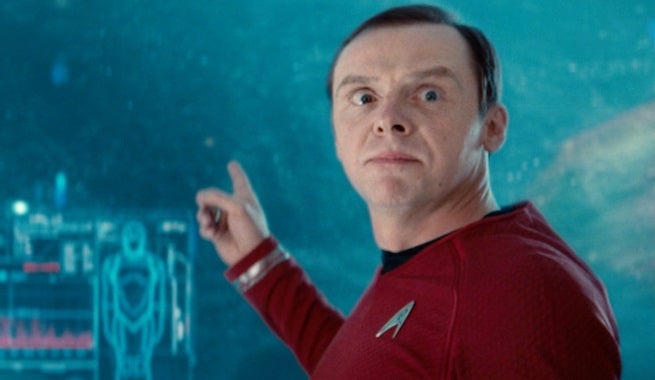Star Trek's Sulu Sexuality: Simon Pegg Respectfully Disagrees with George Takei
Many fans were surprised by George Takei's statements about the decision to make the character of [...]

Many fans were surprised by George Takei's statements about the decision to make the character of Hikaru Sulu in Star Trek Beyond an open homosexual. The character, played by Takei in the classic Star Trek series and films and by John Cho, did not have a well-established sexuality either way on screen in the classic interpretation, and Takei himself is openly gay. Writer Simon Pegg (who also stars in the new film series as Scotty) and director Justin Lin intended the reveal about Sulu to be a tribute to Takei, but Takei rejects the change, instead advocating for a new character introduced as the first openly gay one in the Star Trek universe.
Pegg issued a statement Friday morning, "respectfully disagreeing" with Takei, and offering his take on the issue, explaining why he and Lin went the direction they did. In the statement, Pegg argued the exact opposite of Takei, that the idea of a new character being introduced just to be gay would be "primarily defined by their sexuality" and "tokenism." By making an existing character gay, and not making it a major plot point or focus, he felt it was a better way of introducing homosexuality into the franchise.
"Justin Lin, Doug Jung and I loved the idea of it being someone we already knew because the audience have a pre-existing opinion of that character as a human being, unaffected by any prejudice. Their sexual orientation is just one of many personal aspects, not the defining characteristic," Pegg wrote. Because people are already fans of Sulu the person, introducing his sexuality now, after they've already formed their opinion of the character has a larger impact, he argues.
He also points out that Roddenberry's decisions about homosexuality or a lack thereof were business-oriented, and not creative.
The full statement by Simon Pegg follows. Star Trek Beyond is in theaters July 22, 2016.
"I have huge love and respect for George Takei, his heart, courage and humour are an inspiration. However, with regards to his thoughts on our Sulu, I must respectfully disagree with him.
"He's right, it is unfortunate, it's unfortunate that the screen version of the most inclusive, tolerant universe in science fiction hasn't featured an LGBT character until now. We could have introduced a new gay character, but he or she would have been primarily defined by their sexuality, seen as the 'gay character', rather than simply for who they are, and isn't that tokenism?
"Justin Lin, Doug Jung and I loved the idea of it being someone we already knew because the audience have a pre-existing opinion of that character as a human being, unaffected by any prejudice. Their sexual orientation is just one of many personal aspects, not the defining characteristic. Also, the audience would infer that there has been an LGBT presence in the Trek Universe from the beginning (at least in the Kelvin timeline), that a gay hero isn't something new or strange. It's also important to note that at no point do we suggest that our Sulu was ever closeted, why would he need to be? It's just hasn't come up before.
"I don't believe Gene Roddenberry's decision to make the prime timeline's Enterprise crew straight was an artistic one, more a necessity of the time. Trek rightly gets a lot of love for featuring the first interracial kiss on US television, but Plato's Stepchildren was the lowest rated episode ever.
"The viewing audience weren't open minded enough at the time and it must have forced Roddenberry to modulate his innovation. His mantra was always 'infinite diversity in infinite combinations'. If he could have explored Sulu's sexuality with George, he no doubt would have. Roddenberry was a visionary and a pioneer but we choose our battles carefully.
"Our Trek is an alternate timeline with alternate details. Whatever magic ingredient determines our sexuality was different for Sulu in our timeline. I like this idea because it suggests that in a hypothetical multiverse, across an infinite matrix of alternate realities, we are all LGBT somewhere.
"Whatever dimension we inhabit, we all just want to be loved by those we love (and I love George Takei). I can't speak for every reality but that must surely true of this one. Live long and prosper."
0comments